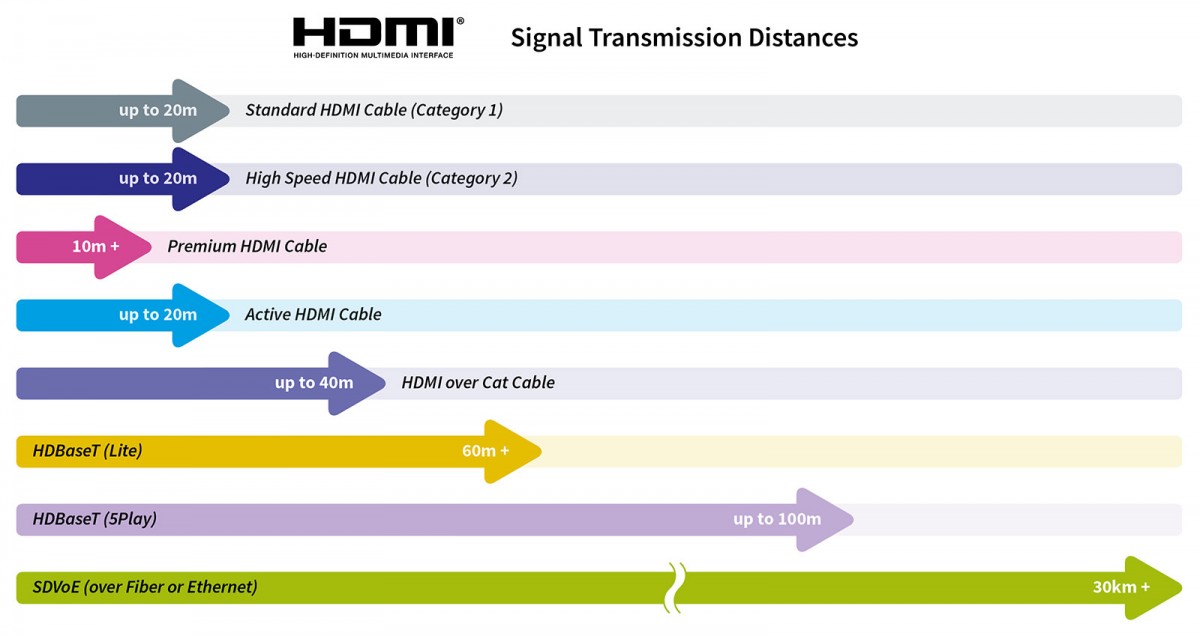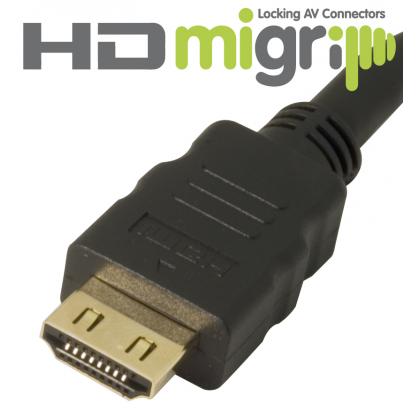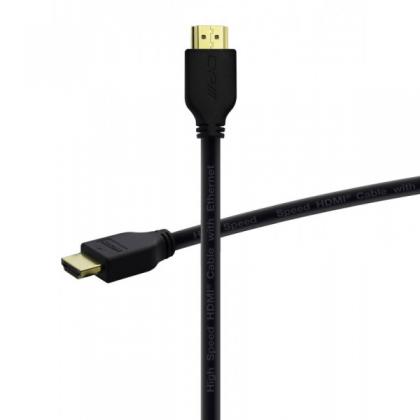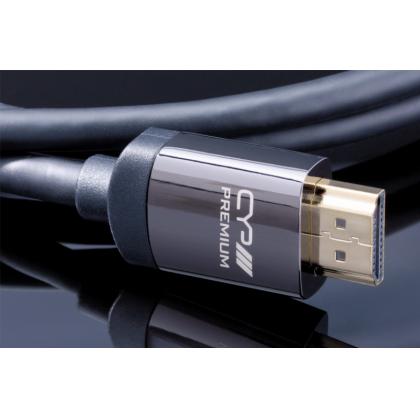Which HDMI cable is best?
CIE's HowToAV talks to cable expert James Chen from Kordz to discuss how HDMI cable performance standards should be considered for a professional AV system.
There are a number of different standards for HDMI cable - Standard, High Speed and, most recently - Premium (18 Gbps), designed to deliver the high bandwidth demands of audio visual signals. But the argument rages on as to whether or not 'more expensive' or higher quality cables are actually needed or if they make a difference!
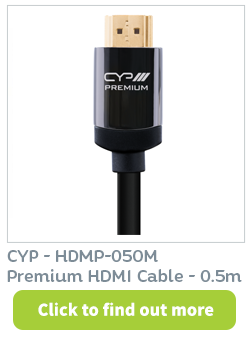 What is a HDMI Cable?
What is a HDMI Cable?
High Definition Multimedia Interface - is the most frequently used HD signal for transferring both high definition video and audio over a single cable.
HDMI is used both in the commercial AV sector and is the most used cable in homes connecting devices such as digital TV, DVD player, BluRay player, Xbox, Playstation and AppleTV with the television.
But all HDMI leads are not the same! There is a plethora of cable standards, cable qualities and HDMI cable budgets on the market claiming to transmit the very best quality of video and audio. However, as HDMI is simply a digital signal (zeros and ones!) - isn't it a case of the signal - and therefore the cable - simply works, or it doesn't?..
These days it really isn't that simple; increased resolutions - UHD, 4k, 8k - require significantly increased bandwidth capabilities - now up to 18Gbps - and so 'high speed' HDMI cable standards, known as the Premium HDMI Cable Certification Program may be required to achieve high quality, uninterrupted AV signal transmission.
What is the difference between HDMI standards of cable?
There are various standards of HDMI cable types plus a special cable certification designation; each is designed to meet a particular performance standard.
 Standard HDMI Cable -
Standard HDMI Cable -
Designed to handle most home applications and tested to transmit 1080i/720p video – HD resolutions commonly associated are: cable TV, digital broadcast BluRay players and video games consoles.
 Standard HDMI Cable with Ethernet –
Standard HDMI Cable with Ethernet –
Offering the same AV transmission performance as Standard HDMI Cable (720p or 1080i video resolution), plus a dedicated data channel otherwise known as the HDMI Ethernet Channel for device networking - eg. smart TV and IP control AV devices.
 High Speed HDMI Cable -
High Speed HDMI Cable -
Designed and tested to support video resolutions of 1080p and more, including display technologies such as 4K UHD, 3D and Deep Colour. This is a recommended cable if you are using any of these technologies or connecting your 1080p display to a 1080p content source e.g. a Blu-ray Disc player.
High Speed HDMI Cable with Ethernet - Offering the same video transmission performance as the High Speed HDMI Cable (1080p video resolution and more), plus a dedicated HDMI Ethernet Channel for device networking.
 Premium High Speed HDMI Cable and Premium High Speed HDMI Cable with Ethernet -
Premium High Speed HDMI Cable and Premium High Speed HDMI Cable with Ethernet -
Special certification designations for High Speed HDMI Cables that have been designed/certified for reliable performance for 4K and UltraHD. This includes advanced features such as HDR, 4K60, expanded colour spaces including 4:4:4 chroma sampling and BT.2020. They have low EMI and identify them by HDMI Licensing Administrator’s Premium HDMI Cable Certification Label for authentication verification.
What is ‘Full 4K’?
Full 4k has an aspect ratio of 17:9, which is designed to match the format of standard cinema screens, with a resolution of 4096 - 2160 pixels.
UHD TV (Ultra High Definition) is, understandably, frequently referred to in the same breath as the same technology format. However, there is a difference in that UHD has an aspect ratio of 16:9 (3840 x 2160 pixels), which is slightly narrower to match the standard format of modern TVs, screens and displays.
With the increase in resolution (and even more so with the release of 8k) comes an increase in bandwidth transmission requirements and, therefore, the need to ensure the right HDMI cable standard to meet those transmission needs.
How do I decide which HDMI lead to use?
All HDMI cables are not the same! and all AV / home entertainment systems are not the same! So don't always take someone else's word for it until you have considered all of the factors which will affect signal transmission performance.
- How long is the cable that you need? Measure the distance from Source to Display accurately and try to keep your cable length as short as is sensibly possible. The shorter the cable length, the shorter the transmission distance, the more reliable it will be.
- What resolution of signal are you transmitting? 720p, 1080p, HD, 4k UHD, 8k? The higher the resolution of picture, the greater the bandwith of signal to be transmitted?
- Additional functionality? Is your signal HDR or 3D perhaps? Or do you want to send data (Ethernet) over the same cable? (for smart TVs or control for example)
- And if you're looking to transmit to distances in excess of 20 metres - and you have multiple signals to transmit (data, control, IR), then perhaps employing HDBaseT may provide the solution
And in considering specific features you want to transmit, make sure that those features are supported in all the HDMI devices on the system (Source, Display, Extender Kits, Splitter, Matrix, etc)
HDMI Cable transmission distances - How far will each cable standard transmit?
Ok, so there is no 'de facto' maximum distance per HDMI cable standard type! There are a wide range of factors that can and will affect the distance your cable will transmit signals.
Resolution of image, quality of cable, interference, environment, Ethernet cable standard (in the case of HDMI-over-Cat, HDBaseT, etc).
However, as a (very!) general rule of thumb, the below diagram shows the approximate transmission distances of each of the HDMI cable standards, as well as HDMI over Cat cable, HDBaseT and SDVoE.
Remember that different manufacturers will specify the distance capabilities of their cables in very different ways - and you can expect some to quote you the absolute maximum distance capable. Don't automatically expect to achieve these results! Your system and environment may be very different.
Is interference going to affect the HDMI signal?
Good quality cable is built to deal with interference. However, in 'noisier' signal environments (for example, within a highly populated rack, or adjacent to electrical cables or other electrical devices, HDMI cable can still be susceptible to interference and additional shielding might benefit. Additionally, the longer the cable run, the more susceptible the signal is to interference.
It's worth noting that as HDMI is a digital signal, one of the most common results of interference is intermittent signal drop-out.
Fault finding tips:
SIMPLIFY! – Sometimes it’s better to simplify and cut back all the different transmissions e.g. the sources, splitter, AV receiver, TV, extenders and junction boxes. The more you can minimise that the more successful the signal is. This means better sound and picture.
TEST IT! – Where you can’t simplify test it before you install it.
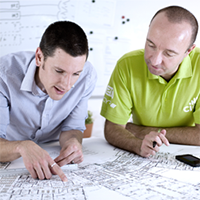 Want help choosing the right HDMI product or with your AV system design?
Want help choosing the right HDMI product or with your AV system design?
CIE is one of the UK's leading and most innovative professional AV distributors and is a leading provider of AV signal and HDBaseT professional systems and devices.
With over 50 years experience in supply and system design for many of the UK's largest, high profile audio projects, our AV experts provide a unique level of technical support and customer service.
Call the CIE AV experts now on T. 0115 9770075 or email us at [email protected]
 Got a question for CIE's HowToAV team?..
Got a question for CIE's HowToAV team?..
HowToAV.tv provides a whole host of tips, tricks and technology know-how for the professional audio visual industry.
If you have a question for our AV experts, please contact us now.
Subscribe to our YouTube channel now at howtoav.tv for all the latest video casts or send us your questions to [email protected]
